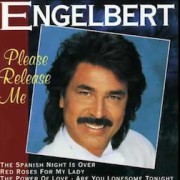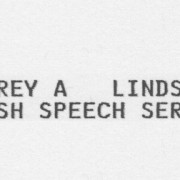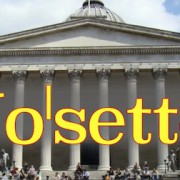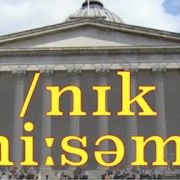Points of view on point of views
 This week TV channel Euronews inaugurated its new global HQ, a bright green cube, in the French city of Lyon. As part of the celebrations, animations were displayed on the side of the building. Among these I was struck by the phrase point of views, which seemed to me a mistake.
This week TV channel Euronews inaugurated its new global HQ, a bright green cube, in the French city of Lyon. As part of the celebrations, animations were displayed on the side of the building. Among these I was struck by the phrase point of views, which seemed to me a mistake.
I, like the major dictionaries, feel that the correct plural should be points of view, like prisoners of war. However the logic isn’t quite so clear in the case of point of view. Prisoners of war definitely refers to several prisoners, regardless of the number of wars. But when we pluralize point of view, we’re talking not only about several points or positions but also about several views.
As for the display in Lyon, I think the influence of French can be detected. Point de vues is established in French alongside points de vue. (The -s is silent in French, so the two forms sound the same.) Point de vues can be used with both singular and plural articles: Google gives plenty of results for ‘le point de vues’ (singular) as well as ‘les point de vues’ (plural).
If we search Google for English point of views, we find the phrase used quite widely, but not generally by professional writers, and a number of those who use it seem not to be natives. It’s worth noting that the form points of view is sustained in the minds of many Britons as the title of a BBC programme which has been on TV for over half a century: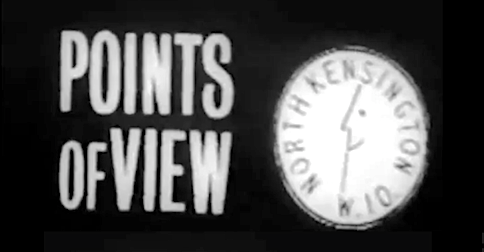 Points of view is a bit harder to say than point of views, as it has the sequence /nts/ in the middle:
Points of view is a bit harder to say than point of views, as it has the sequence /nts/ in the middle:
But I’d recommend sticking to it if native English is your target. On the other hand, point of views seems to exist as a part of international English, and it’s equally understandable.
Predecessors and successors
 There’s much talk in the English-speaking world about political succession. To succeed in this sense is to come after another in a series, while to precede is to come before. Jeremy Corbyn has succeeded Ed Miliband (his predecessor) as leader of Britain’s Labour Party, and this week the Conservative Party’s conference prompted discussion of who will succeed Prime Minister David Cameron. Meanwhile there’s increasing media coverage of America’s long process to find President Obama’s 2016 successor.
There’s much talk in the English-speaking world about political succession. To succeed in this sense is to come after another in a series, while to precede is to come before. Jeremy Corbyn has succeeded Ed Miliband (his predecessor) as leader of Britain’s Labour Party, and this week the Conservative Party’s conference prompted discussion of who will succeed Prime Minister David Cameron. Meanwhile there’s increasing media coverage of America’s long process to find President Obama’s 2016 successor.
With their parallel meanings, you might expect predecessor and successor to have parallel stress patterns. But they don’t. Successor is stressed on its middle syllable, suc-CES-sor or /səkˈsɛsə/:
Many non-natives apply the same pattern to predecessor, but in native speech it’s generally stressed on the first syllable, PRE-decessor. Also, the vowel in the first syllable of this word is different in America and Britain: Americans generally use the DRESS vowel, as in President and preference, while Brits use the FLEECE vowel, as in previous and precinct: AmE /ˈprɛdəˌsɛsɚ/, BrE /ˈpriːdəˌsɛsə/:
A tip for learning this is that predecessors come earlier and have early stress, while successors come later and have later stress.
Further notes
The mark /ˌ/ in the transcriptions above indicates a ‘secondary’ (weaker) stress on the penultimate syllable of predecessor. Many dictionaries don’t show it at all; you shouldn’t be misled by it into making the syllable prominent in your intonation contour.
Audio
 I was reminded while teaching this week how tricky the word audio is, but how instructive it can be. When non-natives pronounce this word in English, they can be misled by the spellings of the first and last vowels. The spelling au suggests a complex vowel that changes in quality (a diphthong); the spelling o suggests a simple, pure vowel that doesn’t change (a monophthong). But in English the reverse is true.
I was reminded while teaching this week how tricky the word audio is, but how instructive it can be. When non-natives pronounce this word in English, they can be misled by the spellings of the first and last vowels. The spelling au suggests a complex vowel that changes in quality (a diphthong); the spelling o suggests a simple, pure vowel that doesn’t change (a monophthong). But in English the reverse is true.
The vowel at the beginning of audio is a pure monophthong, known as the THOUGHT vowel because it’s the vowel in the word thought. This vowel is most commonly shown in dictionary transcription as /ɔː/ (British and ‘Eastern’ American) or as /ɑː/ (‘Western’ American). These symbols indicate long vowels which don’t change in quality. Here I am saying BrE audio, normally then with a prolonged first vowel to demonstrate how unchanging it is:
The vowel at the end of audio is a diphthong, the GOAT vowel (yes, it’s the vowel in the word goat). It’s most commonly shown in dictionary transcription as /əʊ/ (British) and /oʊ/ (American). These symbols indicate the different qualities at the start and end of the vowel. Here I am saying BrE /əʊ/, first at normal speed, then prolonged to reveal the change in quality from an ə-type sound to an u-type sound:
Here are some transcriptions of the word audio from online dictionaries. They’re all different, but at least they all agree that the first vowel is a monophthong, and the last vowel is a diphthong:
British: /ˈɔː.di.əʊ/ (Cambridge), /ˈɔːdɪˌəʊ/ (Collins), /ˈɔːdɪəʊ/ (Oxford Dictionaries)
American: /ˈɑː.di.oʊ/ (Cambridge), /ˈɑːdiˌoʊ/ (Merriam-Webster Learner’s), /ˈɔːdioʊ/ (Oxford Learner’s)
Further notes
The word audio is actually quite consistent with generalizations of spelling and pronunciation in English. Hundreds of words end with the final letter o pronounced as the GOAT diphthong:
hello, no, so, also, go, ago, euro, hero, photo, solo, studio, video, Romeo, Chicago, Toronto, etc
but final o is never pronounced with the THOUGHT monophthong. On the other hand, au is pronounced in hundreds of words as the THOUGHT monophthong:
August, author, auto, autumn, cause, fraud, haunt, launch, laundry, Paul, pause, etc
but au is not pronounced with the GOAT diphthong – except in French borrowings like:
aubergine, au pair, au fait, chauffeur, faux pas, Flaubert, gauche, mauve, sauté, Sauvignon, etc.
Super
 Last night we had the coincidence of a supermoon and a total lunar eclipse. A supermoon is a full moon when the moon is at its closest to the earth, and a lunar eclipse is the moon’s passing through the earth’s shadow. The last time this happened was 1982.
Last night we had the coincidence of a supermoon and a total lunar eclipse. A supermoon is a full moon when the moon is at its closest to the earth, and a lunar eclipse is the moon’s passing through the earth’s shadow. The last time this happened was 1982.
Back in 1982 there were still quite a few people who gave super the pronunciation /ˈsjuːpə/, as if it were s-you-per:
I fairly often find myself teaching non-natives who pronounce it this way, and who are shocked to be told it’s no longer a common pronunciation. Such speakers may be quite young, but had old-fashioned teaching. Nowadays the typical standard pronunciation has no /j/ and begins like soup:
This goes beyond the word super. In fact, teachers of English pronunciation today can reasonably give their students a nice general rule: English words never begin with /sj/. This goes for supervise, supermarket, sue, suit, suitable, suicide, superb, superfluous, superior, supreme, Susan, and so on.
There are still some British speakers who say such words with /sj/, but many natives now find this amusingly old-fashioned. Even at the time of the last supermoon-eclipse it was on the way out. Windsor-Lewis’s 1974 dictionary of ‘General British’ gave only the /j/-less pronunciation of super, and Gimson’s 1977 dictionary of ‘Received Pronunciation’ put the /j/-less pronunciation first, with the advice
Note.– super in isolation and in compounds is increasingly ˈsuːpə.
I wonder how many users of /ˈsju:pə/ will be around when the next supermoon-eclipse occurs, in 2033?
An wholehearted assurance?
 The week began with major figures in Britain’s Labour Party refusing to serve in the shadow cabinet of Jeremy Corbyn, their new left-wing leader. London’s Evening Standard newspaper told us that
The week began with major figures in Britain’s Labour Party refusing to serve in the shadow cabinet of Jeremy Corbyn, their new left-wing leader. London’s Evening Standard newspaper told us that
Chuka Umunna stood down as shadow business secretary complaining the new leader had refused to give him an “wholehearted” assurance he would not campaign to stay in Europe.
An wholehearted assurance? I think many native speakers would agree that an looks a bit odd here and feels even odder to say. The indefinite article is generally a before a consonant (eg a child) and an before a vowel (eg an adult), and whole begins with the consonant /h/.
We do sometimes find an used before h in adjectives like historic, hilarious and hysterical, and nouns like historian, horizon, and hallucination. This is related to stress. English /h/ is /h/appiest in stressed syllables. By contrast, in unstressed little words like he, her, him, /h/ is often weakly pronounced or dropped altogether – even in careful speech – so that we hear eg What did you /gɪv‿ɪm/ (give him)?
The first syllable of words like historic is similarly unstressed, and the weakness of the /h/ there encourages the use, by some at least, of preceding an rather than a. Personally, I find it a bit more comfortable to drop the /h/ and say /ən‿ɪ/storic event
than /ə‿hɪ/storic event
but the latter is perfectly standard contemporary English.
So what about wholehearted? Its main stress is on the middle syllable. If I type ‘wholehearted’ into Google, I’m presented with this:
![]() which suggests that the first syllable whole- is unstressed. But whole- is not fully unstressed; many dictionaries give it a secondary stress mark, eg /ˌhəʊlˈhɑː.tɪd/. Furthermore, in a phrase like wholehearted assurance, whole- may well be more prominent than -hearted (thanks to the phenomenon known by names such as ‘the rhythm rule’ or ‘stress shift’):
which suggests that the first syllable whole- is unstressed. But whole- is not fully unstressed; many dictionaries give it a secondary stress mark, eg /ˌhəʊlˈhɑː.tɪd/. Furthermore, in a phrase like wholehearted assurance, whole- may well be more prominent than -hearted (thanks to the phenomenon known by names such as ‘the rhythm rule’ or ‘stress shift’):
which makes the use of an before it seem rather odd. The simplest recommendation for non-natives, I think, is always to use a, not an, before the sound /h/ (as in happy, historic and wholehearted but not in hour or honest, where the letter h is silent). This is always correct.
Further notes
To some extent the use of an before /h/ is a/an historic hangover. It seems that a century or more ago /h/ was never pronounced in unstressed syllables, so the h in historic was as silent as the h in hour or honest. Gradually such h‘s began to be pronounced.
A few years back John Wells’s blog discussed the similar case of an homosexual.
Please release me
The spelling of English consonants is fairly reliable, certainly clearer than the spelling of English vowels. But one tricky aspect of consonant spelling is the fact that the letter s, when in the middle or at the end of a word, so often stands for the sound /z/.
This came up during the short course I’ve just given in Helsinki, in connection with words whose spelling ends -ease. The most common examples are divided roughly equally between those which have /s/ and those which have /z/. (Several of the course participants’ mother tongues – Finnish, Russian, Estonian, Swedish – lack a contrast between final /s/ and /z/.)
The /s/ words include release and lease; crease, increase and decrease (both verbs and nouns); also grease, cease and decease(d):
The /z/ words include please and displease; disease, ease and unease (as well as easy and uneasy); and also appease and pease:
You should be able to hear that final /s/ is stronger and longer than final /z/, while the preceding vowel, conversely, is shorter before /s/ and longer before/z/. If you can’t hear it, listen to the above clips until you can. You can also use Engelbert’s song as a reminder of the vowel length difference: Pleeeeeeeaaaaze releaSe me.
Further notes
Not included in the above are specialized words referring to enzymes, such as nuclease and protease, which are trisyllabic and end in /z/: nu-cle-ase, pro-te-ase:
Irrational national?
 In my experience, non-natives often mispronounce the word national. They wrongly assume that the first part is pronounced the same as the word nation.
In my experience, non-natives often mispronounce the word national. They wrongly assume that the first part is pronounced the same as the word nation.
In native pronunciation, however, nation has the long a of face, day and major, while national has the short a of trap, fashion and passion. Here are the two words, each followed by its first part:
(In the transcription of Oxford Dictionaries, these are /ˈneɪʃ(ə)n/ and /ˈnaʃ(ə)n(ə)l/. The parentheses indicate that the weak schwa sounds may not be sounded at all.)
So nation rhymes with station, location and situation (in fact with all words that have the suffix -ation), while national rhymes with rational, irrational – and not much else. You might say it’s quite an irrational pronunciation.
Note that ration also has short a. There are only three common 2-syllable words ending -ation, namely nation, station, ration, and ration is the odd one out: /ˈraʃ(ə)n/.
Further notes
As Eric Armstrong (@voiceguy on Twitter) points out, American English allows ration to be pronounced with the short a or, alternatively, with the long a like nation and station. The short variant /ˈræʃən/ is the first or only variant given in the American dictionaries I’ve consulted.
Geossrey
 I returned home from UCL’s Summer Course in English Phonetics to find a letter from an American organization addressed to ‘Geossrey A Lindsey’. I’d previously given my name over the telephone to an employee of this organization, a native speaker of American English. Twice I spelled my name out to her, believing that I was speaking clearly, and she spelled it out back to me, to my satisfaction. But still the error happened.
I returned home from UCL’s Summer Course in English Phonetics to find a letter from an American organization addressed to ‘Geossrey A Lindsey’. I’d previously given my name over the telephone to an employee of this organization, a native speaker of American English. Twice I spelled my name out to her, believing that I was speaking clearly, and she spelled it out back to me, to my satisfaction. But still the error happened.
As I explained during the Question Time on SCEP’s last day, telephone lines transmit the lower frequencies most crucial for conveying linguistic information but don’t transmit higher frequencies well. When we listen to telephone speech, often we don’t clearly hear /f/ or /s/ sounds, because /f/ is too weak and /s/ is too high: we hear gaps which our brains fill in on the basis of contextual knowledge. Here are the two syllables Geoff/Jeff /dʒɛf/ and Jess /dʒɛs/, followed by their final fricatives:
(English /s/ is a high-frequency sound with strong acoustic energy concentrated mainly above the conventional upper limit of telephone lines – around 4 kilohertz, ie 4,000 vibrations a second. By contrast /f/ is a weaker fricative, its energy diffused over a wide range of frequencies.)
In the case of my transatlantic conversation, the employee didn’t have the appropriate contextual expectations for her brain to fill in the right letter. The spelling Geoffrey is a lot less common than Jeffrey in the United States, and Geossrey evidently seemed to her a possible name for a distant Englishman. And, when she spelled Geossrey back to me, I didn’t hear that she was saying /s/’s rather than /f/’s.
Probably I should have used the NATO spelling alphabet and told her that my name is written with Foxtrot Foxtrot, not Sierra Sierra. Aside from the challenges of telephones, a take-home message for non-native English speakers is that the English /s/ is strong and loud, distinguishing it especially from weak /θ/ and /f/, and also is high in quality, to distinguish it from the lower-pitched /ʃ/. In languages where /s/ does not have to be distinguished from /θ/ or /ʃ/, it is often weaker or lower-pitched in quality than in English.
Josette and stress
 Sadly we come to the final day of UCL’s Summer Course in English Phonetics 2015. As in previous years, the grand finale of the course is the Question Time session hosted today by our tutor Josette Lesser.
Sadly we come to the final day of UCL’s Summer Course in English Phonetics 2015. As in previous years, the grand finale of the course is the Question Time session hosted today by our tutor Josette Lesser.
Josette’s first name also has something of a grand finale, in that its primary stress lies on the final syllable: /dʒəʊˈzet/.
This makes Josette absolutely unique among all the polysyllabic names of our tutors and lecturers. The majority have initial stress: Carley, Chatterjee, Harris, Huckvale, Inger, Lesser, Lindsey, Margaret, Miller, Neasom and Setter. This is in keeping with the tendency for English two-syllable nouns to have initial stress, those with initial stress outnumbering those with final stress by around ten to one.
The reason for the final stress on Josette is its fairly recent French provenance and the ending -ette. Common two-syllable nouns with this stress-attracting ending include brunette, courgette, gazette, rosette and roulette.
Josette herself is the opposite of stress-attracting: a graduate in Linguistics from UCL (like me), she gives workshops here on media and presentation skills to help non-native speakers of English perform well under pressure.
I hope you’ve enjoyed these posts from SCEP. I wish our participants a safe trip back to your homes around the world, and I sincerely hope the course has planted the seeds of growing insight and confidence as you listen to, produce, and enjoy the sounds of English.
Bye until SCEP 2016!
SCEPlog 1 Postalveolar Jane SCEPlog 2 Aspirational Paul
SCEPlog 3 Sam /v/ictor /w/ood SCEPlog 4 Bob Ladd
SCEPlog 5 Non-rhotic Margaret SCEPlog 6 Devoiced Cris
SCEPlog 7 Unaspirated Scott SCEPlog 8 ‘ng’ as in Inger & Young Shin
Nick’s commonness
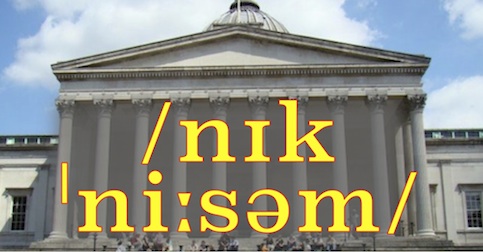 It’s already the ninth and penultimate day of the UCL Summer Course in English Phonetics, and some of our participants are thinking about continuing their study of speech and language at UCL. Today we have a presentation on this by SCEP lecturer Prof John Harris and SCEP tutor Nick Neasom, who is a third year PhD student here.
It’s already the ninth and penultimate day of the UCL Summer Course in English Phonetics, and some of our participants are thinking about continuing their study of speech and language at UCL. Today we have a presentation on this by SCEP lecturer Prof John Harris and SCEP tutor Nick Neasom, who is a third year PhD student here.
Nick’s names conveniently contain what have been estimated to be the three most common vowels of English: schwa /ə/, KIT /ɪ/ and FLEECE /iː/:
(The commonness of FLEECE is boosted if it’s taken to include the so-called happY vowel /i/ as a variant.)
Certainly it’s a high priority to master these vowels if you want to get closer to native-type pronunciation, though they present definite challenges.
The most common vowel of all, schwa, is a mid central vowel, located right in the centre of the vowel space and rather ‘colourless’ in quality. There’s no letter for it in the normal English alphabet, and it can correspond to various different spellings, eg astronomer /əˈstrɒnəmə/. Many very frequent ‘function words’ are usually pronounced with it, even in careful speech. Listen to this clip of European Commissioner Jonathan Hill saying ‘It’s a great pleasure for me to be here right at the start of my term’:
(© European Union 2015)
In the space of less than five seconds, he pronounces a, for, to, at, the, of as /ə fə tə ət ðə əv/.
The KIT and FLEECE vowels are difficult for many speakers of English as L2, but it’s important to work on these vowels because they differentiate many words such as ship and sheep, as well as notorious ruder examples. KIT is shorter, more lax, and has a quality roughly between the cardinal vowels [i] and [e]. FLEECE is longer, more tense, and can have a slightly diphthongal (changing) quality rather like [ɪi] or [ɪj].
It’s useful to hear pairs of words differing in these vowels, so I thought I’d let you compare Nick Neasom /nɪk ˈniːsəm/
with the imaginary name Neak Nissom /niːk ˈnɪsəm/:
(If that isn’t amusing enough for you, and it probably isn’t, you could try the versatile Nick’s standup comedy act.)
SCEPlog 1 Postalveolar Jane SCEPlog 2 Aspirational Paul
SCEPlog 3 Sam /v/ictor /w/ood SCEPlog 4 Bob Ladd
SCEPlog 5 Non-rhotic Margaret SCEPlog 6 Devoiced Cris
SCEPlog 7 Unaspirated Scott SCEPlog 8 ‘ng’ as in Inger & Young Shin






